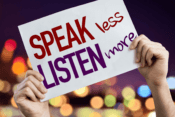
Public Speaking Tips for Professionals: Mastering the Art of Effective Communication
Everyone, at some point, will find themselves needing to speak in public. It might be a formal presentation at work, a toast at a friend’s wedding, or even a spontaneous speech at a party. The need can arise unexpectedly, catching you off guard. In moments like that, confidence and preparation make all the difference.
Public speaking is a crucial skill that can significantly impact your professional growth. Whether you’re delivering a business presentation, leading a team meeting, or speaking at a conference, the ability to communicate clearly and confidently can set you apart. However, many professionals struggle with stage fright, lack of engagement, and unclear messaging.
In this comprehensive guide, we’ll explore essential public speaking tips backed by expert opinions, research from reputable business sources, and practical strategies to help you excel in any speaking engagement.
1. Understand Your Audience
One of the most important aspects of public speaking is knowing your audience. According to Harvard’s Division of Continuing Education, effective speakers tailor their message to the audience’s level of expertise, interests, and expectations. Before preparing your speech, consider:
- Who is your audience?
- What do they already know about your topic?
- What are their expectations from your presentation?
Understanding these elements allows you to craft a speech that resonates and engages your listeners.
2. Master Your Material
Confidence in public speaking stems from deep knowledge of your subject. A well-prepared speaker can handle unexpected questions, maintain a smooth flow, and adapt to audience reactions. According to Forbes, professionals who master their content exude credibility and authority. To achieve this:
- Research your topic thoroughly.
- Organize key points logically.
- Practice multiple times until you internalize the material.
3. Structure Your Presentation Effectively
A compelling presentation follows a structured format:
Introduction: Start with a strong hook—such as a statistic, question, or personal story—to capture attention.
Body: Present key points clearly and concisely. Use examples, data, and stories to illustrate concepts.
Conclusion: Summarize key takeaways and end with a call to action or memorable statement.
According to Harvard Business Review, structured presentations are easier to follow and more persuasive.
4. Develop a Confident Speaking Style
Your delivery matters as much as your content. Here are some key tips to enhance your speaking style:
- Speak at a moderate pace: Avoid rushing through your points. Pausing strategically helps emphasize key ideas.
- Use a strong, clear voice: Project confidence by modulating your tone and avoiding monotony.
- Incorporate body language: Maintain eye contact, use hand gestures, and stand tall to engage your audience.
5. Manage Public Speaking Anxiety
Even experienced professionals experience nerves before a speech. The American Psychological Association suggests these strategies to manage anxiety:
- Practice relaxation techniques: Deep breathing, visualization, and mindfulness can calm nerves.
- Rehearse in front of a mirror or record yourself: Watching your presentation can help identify areas for improvement.
- Focus on the message, not yourself: Shift your mindset from fear of judgment to delivering value to your audience.
6. Engage Your Audience
Interaction keeps your audience interested and enhances retention. According to TED Talks expert Chris Anderson, engaging presentations often include:
- Asking questions: Encouraging participation creates a dynamic environment.
- Using storytelling: Personal anecdotes and relatable stories make content more compelling.
- Incorporating visuals: Slides, charts, and videos reinforce key points and improve comprehension.
7. Adapt to Different Speaking Scenarios
Public speaking varies across settings. Here’s how to adjust for different environments:
- Business Meetings: Keep presentations concise and focus on actionable insights.
- Conferences: Use storytelling and industry trends to captivate a larger audience.
- Virtual Presentations: Maintain eye contact with the camera, use engaging visuals, and check for audience interaction through chat or polls.
8. Use Technology to Your Advantage
Modern tools can enhance your presentation quality. Experts recommend using:
- Presentation software: PowerPoint, Prezi, and Canva help create visually appealing slides.
- Teleprompters or cue cards: Useful for maintaining flow without memorization.
- Speech analysis tools: Apps like Orai and Yoodli provide feedback on pacing, filler words, and tone.
9. Handle Q&A Sessions Like a Pro
Handling questions effectively showcases your expertise. To excel in Q&A sessions:
- Listen carefully before responding.
- Acknowledge challenging questions with poise.
- Prepare for potential queries in advance.
- If you don’t know an answer, admit it and offer to follow up.
10. Seek Continuous Improvement
The best speakers refine their skills over time. According to the Journal of Business Communication, top professionals actively seek feedback and practice regularly. Consider:
- Joining a public speaking group (e.g., Toastmasters International).
- Watching and analyzing great speakers (e.g., TED Talks, keynote speakers).
- Recording and reviewing your speeches to identify areas for improvement.
Final Thoughts
Mastering public speaking can boost your professional credibility, leadership presence, and career growth. By understanding your audience, practicing regularly, and employing engagement techniques, you can become a confident and effective speaker. Start small, refine your approach, and embrace every opportunity to speak in public.
References:
- Harvard Division of Continuing Education: “10 Tips for Improving Your Public Speaking Skills” (professional.dce.harvard.edu)
- Forbes: “Why Professionals Should Embrace Public Speaking and How You Can Get Started” (forbes.com)
- Harvard Business Review: “How to Make Your Presentations More Engaging” (hbr.org)
- American Psychological Association: “Overcoming Public Speaking Anxiety” (apa.org)
- TED Talks: “The Secret to Giving a Great Speech”












